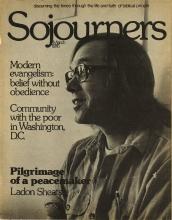Evangelical songwriters John Peterson and Don Wyrtzen have come up with a musical for the bicentennial. Peterson, who confesses “I’m just a flag waving American” in a song by the same title, calls the musical, “I Love America.” The musical, whose tunes are predictable and lyrics trite, is divided into three parts: history, tribute, and plea.
Under the heading, “our history,” Peterson tells us he’s been in Paris, Rome, and “foggy London town” and that the USA has them all beat. Although he doesn’t go into the exact ways in which we are superior, it is clear that in any competition Americans are destined to win. In a song about the revolutionary war, we are told about a poor young Englishman, Johnny Bull, who goes home from America roundly defeated but consoling himself with the thought, “Maybe God above has willed it.” Peterson can’t resist chiming in at that point with the assurance, “So he had my friend, God had willed it so.”
Is the point of this story that God always fights on the side of oppressed people for liberation? No, Peterson’s point seems to be that America is always right. The song “God of our Fathers” is included in the musical and in the context it’s obvious that Peterson sees the fathers as founders of America and that in “Refresh Thy People” the people are Americans. What the song’s author, George Warren, says about the God of “shining world in splendor through the sky” would make one think he was talking about the Lord of the Universe. But for Peterson he doesn’t even seem to be God of the whole world.
Read the Full Article

